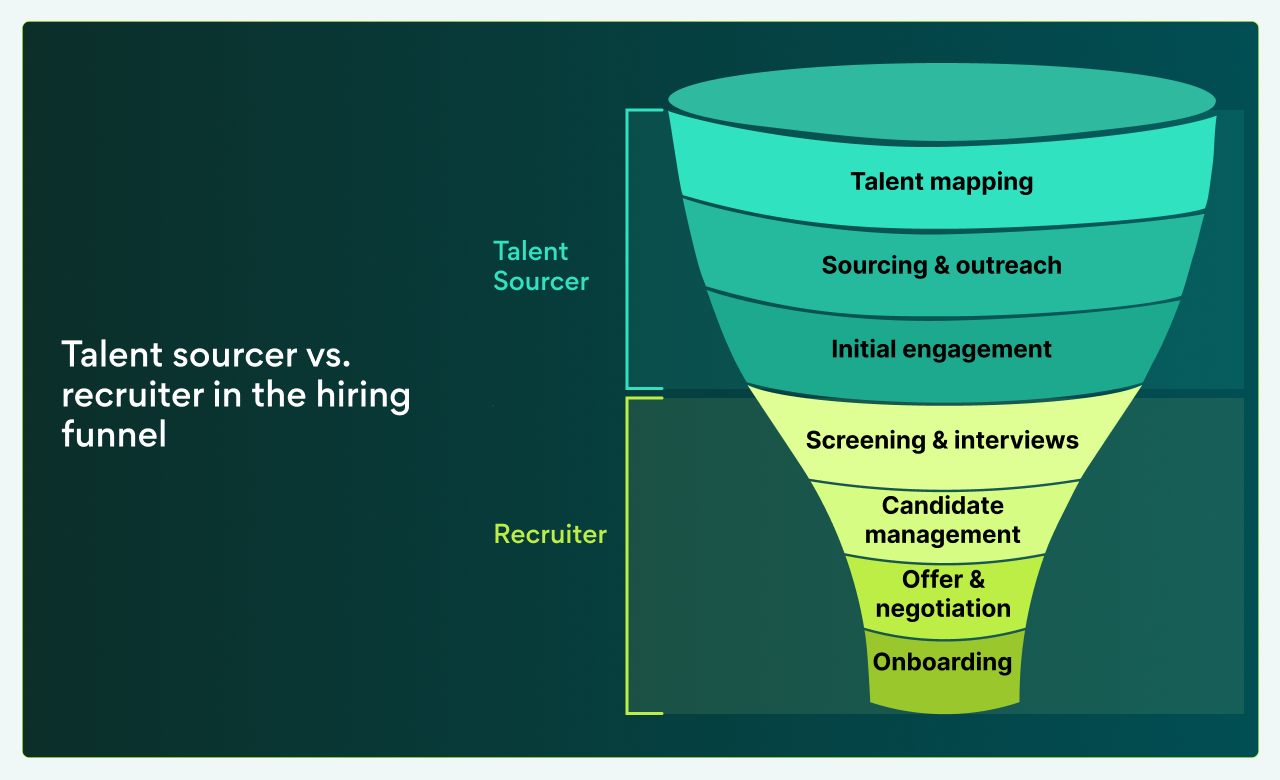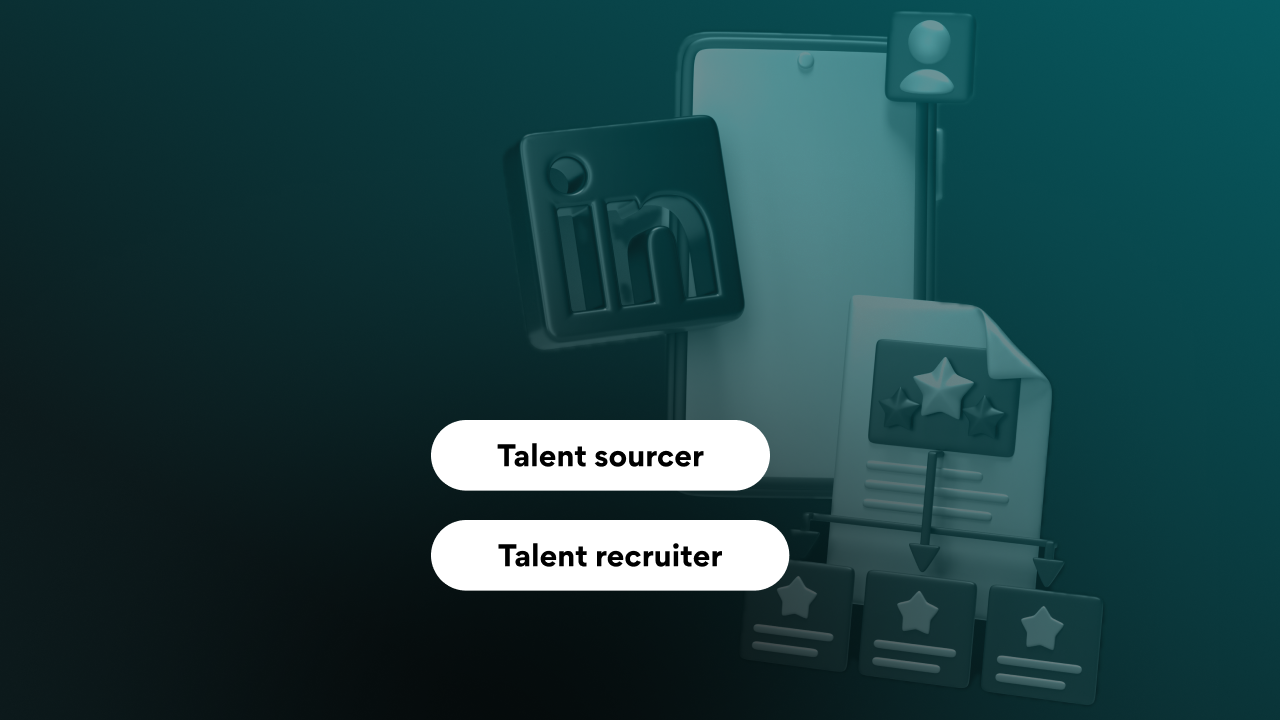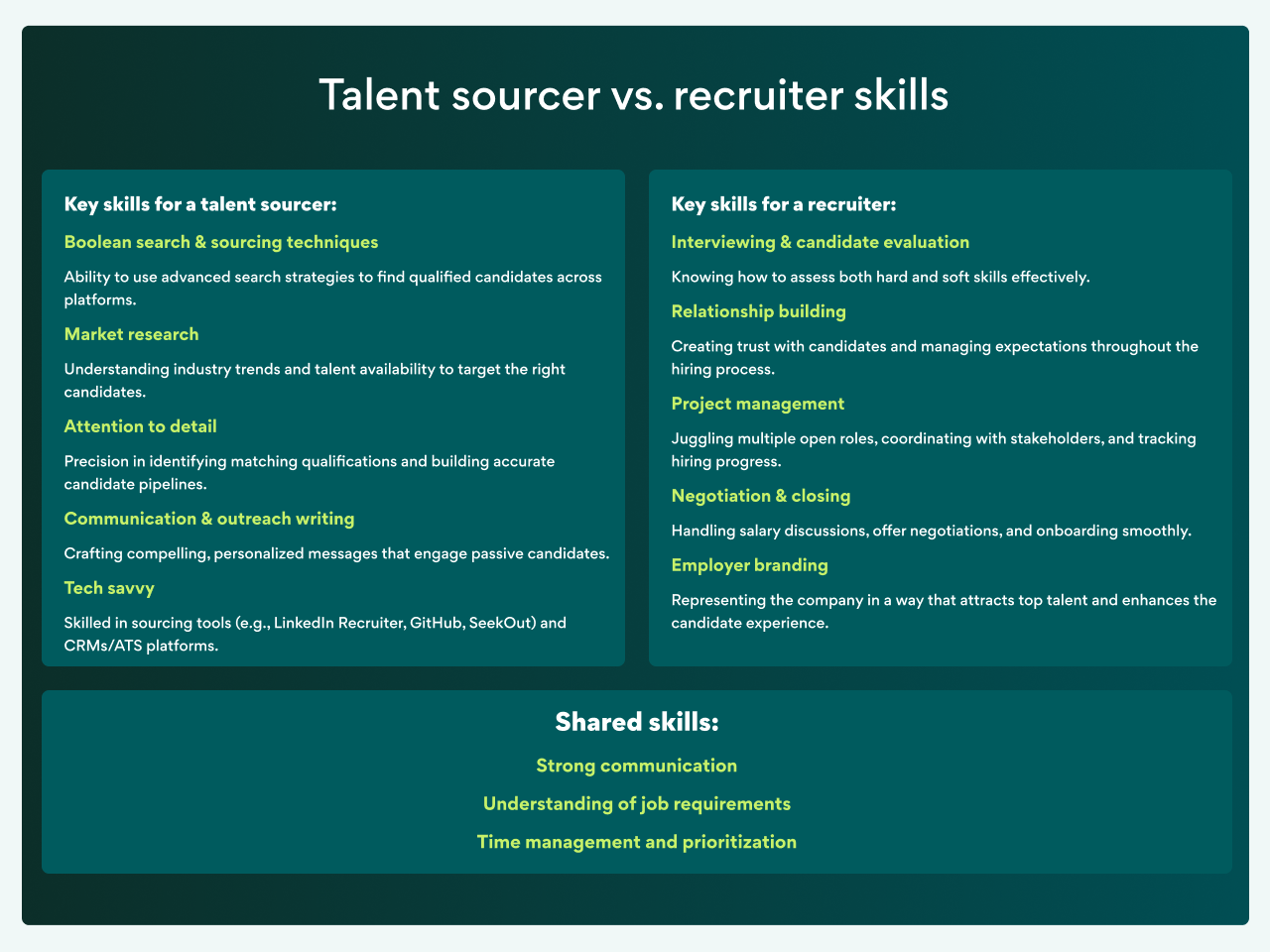



A talent sourcer is a recruitment professional who focuses on finding and attracting potential job candidates, often before they even apply. Their main job is to proactively identify, research, and engage qualified talent for open or future roles, especially for hard-to-fill or highly specialized positions.
Talent sourcers typically work at the top of the hiring funnel. They use sourcing tools, search databases, browse LinkedIn, and tap into networking events to build a pipeline of potential candidates. They may also be responsible for crafting outreach messages and managing the initial contact with prospects.
In most cases, talent sourcers pass qualified leads to recruiters, who then take over the screening, interviewing, and hiring process. In larger organizations, these roles are clearly separated. In smaller ones, one person may perform both functions.
Key responsibilities of a talent sourcer include:
Hiring the right people starts with understanding the roles behind the scenes. Two of the most commonly confused roles in talent acquisition are those of the talent sourcer and the recruiter. Although they often work closely together, their responsibilities and skill sets are quite different.
In this article, we’ll break down the key differences between talent sourcers and recruiters, from what they do and the skills they need, to how much they earn and when to hire each. Whether you’re building a recruitment team or exploring a career in HR, this guide will help you make informed decisions.
A recruiter manages the entire hiring process, from screening candidates and coordinating interviews to negotiating offers and facilitating onboarding. While talent sourcers focus on finding potential candidates, recruiters take those leads and move them through the selection process.

Recruiters act as the bridge between candidates and hiring managers. They evaluate candidate qualifications, communicate job expectations, coordinate interviews, collect feedback, and ensure a positive experience throughout the process. The role is both strategic and administrative, demanding strong interpersonal and organizational skills.
Recruiters may also contribute to employer branding efforts, maintain relationships with past applicants, and help refine job descriptions or hiring strategies.
Key responsibilities of a recruiter include:

Hiring the right people starts with understanding the roles behind the scenes. Two of the most commonly confused roles in talent acquisition are those of the talent sourcer and the recruiter. Although they often work closely together, their responsibilities and skill sets are quite different.
In this article, we’ll break down the key differences between talent sourcers and recruiters, from what they do and the skills they need, to how much they earn and when to hire each. Whether you’re building a recruitment team or exploring a career in HR, this guide will help you make informed decisions.
A talent sourcer is a recruitment professional who focuses on finding and attracting potential job candidates, often before they even apply. Their main job is to proactively identify, research, and engage qualified talent for open or future roles, especially for hard-to-fill or highly specialized positions.
Talent sourcers typically work at the top of the hiring funnel. They use sourcing tools, search databases, browse LinkedIn, and tap into networking events to build a pipeline of potential candidates. They may also be responsible for crafting outreach messages and managing the initial contact with prospects.
In most cases, talent sourcers pass qualified leads to recruiters, who then take over the screening, interviewing, and hiring process. In larger organizations, these roles are clearly separated. In smaller ones, one person may perform both functions.
Key responsibilities of a talent sourcer include:
A recruiter manages the entire hiring process, from screening candidates and coordinating interviews to negotiating offers and facilitating onboarding. While talent sourcers focus on finding potential candidates, recruiters take those leads and move them through the selection process.

Recruiters act as the bridge between candidates and hiring managers. They evaluate candidate qualifications, communicate job expectations, coordinate interviews, collect feedback, and ensure a positive experience throughout the process. The role is both strategic and administrative, demanding strong interpersonal and organizational skills.
Recruiters may also contribute to employer branding efforts, maintain relationships with past applicants, and help refine job descriptions or hiring strategies.
Key responsibilities of a recruiter include:
Although both talent sourcers and recruiters are essential to the hiring process, their focus, tools, and daily responsibilities differ significantly. Recognizing these differences is key to building an effective recruitment strategy.
At a high level, talent sourcers focus on finding talent, while recruiters focus on hiring talent. Sourcers work behind the scenes to identify and engage potential candidates, especially passive ones, while recruiters manage the full recruitment cycle from initial contact through to job offer and onboarding.
Here’s a side-by-side comparison of talent sourcer vs. recruiter across key aspects of the hiring process:
Although recruiters and talent sourcers work toward the same hiring goals, the skills they rely on day-to-day can differ based on their responsibilities. Some skills are shared between both roles, but others are more specific to either sourcing or recruiting.

Both roles benefit from empathy, curiosity, and a genuine interest in connecting the right people with the right opportunities. But the focus of their skills—outreach vs. relationship management—is what truly sets them apart.
While talent sourcers and recruiters may have overlapping skill sets, their salaries and career paths can differ based on factors like experience, industry, company size, and location.
Generally, both roles offer competitive compensation and opportunities for growth within the broader field of talent acquisition. The table below outlines typical salary ranges for talent sourcers and recruiters at different career levels.
Note: Salaries vary widely by region and industry.
Talent sourcers often move into more strategic positions as they gain experience, such as senior sourcer, sourcing manager, or talent intelligence specialist. Their deep understanding of research, data, and candidate behavior positions them well for roles focused on workforce planning and talent insights.
Recruiters, on the other hand, often advance into leadership roles within talent acquisition, such as senior recruiter, recruitment manager, or director of talent. As their responsibilities grow, they may also specialize in areas like employer branding, diversity hiring, or executive search.
It’s also not uncommon for sourcers to transition into recruiter roles, especially if they enjoy candidate interaction, interviewing, and closing hires. Recruiters moving into sourcer roles happens less frequently, but it can happen, especially if the person wants to avoid the administrative aspects of recruiting.
Talent sourcers are increasingly in demand as companies look to engage passive talent and fill specialized roles faster. Their work is becoming more strategic with the help of data and AI-driven tools.
Recruiters remain essential for managing the candidate experience and closing hires. In fast-growing or competitive industries, skilled recruiters are considered critical to business success.
Both career paths offer strong future potential, especially for professionals who continuously upskill in areas like employer branding, recruitment marketing, data analytics, and diversity hiring.
Deciding whether to hire a talent sourcer vs. recruiter, or even both depends on your company’s size, hiring goals, and the complexity of the roles you're trying to fill.
If your business is scaling quickly or struggling to attract qualified candidates, especially for technical or niche positions, a talent sourcer can help you build a pipeline of high-quality talent, including passive candidates who aren’t actively job hunting. Sourcers are particularly valuable when you need to fill roles that require deep industry research or hard-to-find skill sets.
On the other hand, if your team already has strong inbound interest or a list of potential candidates, and you need help managing the hiring process (screening, scheduling, interviewing, and closing offers), a recruiter may be the better choice. Recruiters ensure that candidates move smoothly through each stage of the hiring funnel and that managers are supported in making great hires.
For smaller companies or startups, it's common to hire a full-cycle recruiter who manages both sourcing and recruiting responsibilities. These professionals are skilled at managing the entire hiring pipeline, from identifying prospects to closing offers.
Choosing between a talent sourcer and a recruiter comes down to your hiring needs, team structure, and how many roles you’re trying to fill. Sourcers help you find and engage candidates, while recruiters manage the selection process and drive offers to close. Both roles are important, but depending on your stage of growth, one may be more urgent than the other.
For small businesses or startups, a full-cycle recruiter is often the most practical solution. As hiring needs evolve, companies can choose to add sourcing specialists or restructure their recruitment function for greater efficiency.
But if you're not ready to build an internal recruitment department, there’s another option: working with a recruitment or outstaffing agency. Agencies bring expertise, speed, and flexibility, without the overhead of hiring a full in-house team.
At ALLSTARSIT, we connect businesses with top-tier tech talent. With deep recruiting expertise, our team helps businesses scale faster, whether you're hiring one developer or building an entire offshore team. Let us take the complexity out of hiring so you can focus on growing. Get in touch with us today.
Hiring the right people starts with understanding the roles behind the scenes. Two of the most commonly confused roles in talent acquisition are those of the talent sourcer and the recruiter. Although they often work closely together, their responsibilities and skill sets are quite different.
In this article, we’ll break down the key differences between talent sourcers and recruiters, from what they do and the skills they need, to how much they earn and when to hire each. Whether you’re building a recruitment team or exploring a career in HR, this guide will help you make informed decisions.